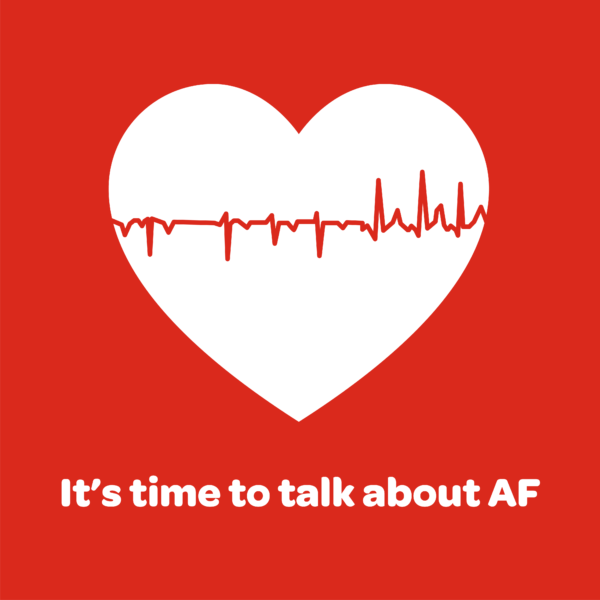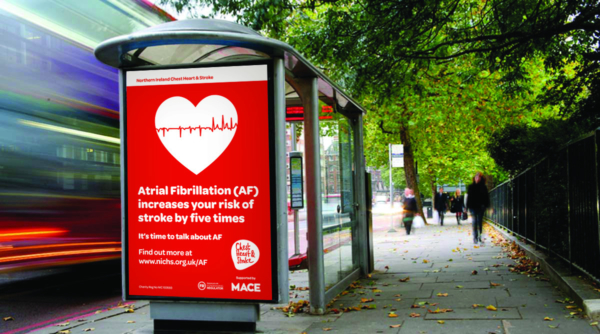Atrial Fibrillation

Atrial Fibrillation, or AF, is one of the most common types of irregular heartbeat in Northern Ireland and can increase your risk of stroke by FIVE times. Over 37,000 people here are living with AF, although it is estimated many more are living with the condition undetected.
What are we doing about AF?
We commissioned an independent opinion survey in October 2018 and found that worryingly, only 30 people in every 1000 had heard of AF and the fact that it can increase your risk of stroke by five times.
Of the 30% who had heard of AF:
- Over a quarter didn’t know about the increased risk of stroke
- Nearly 10% thought AF does not increase your risk of stroke
We believe it is time to talk about AF, to create more public awareness of this condition and its link to stroke - and that is exactly what Northern Ireland Chest Heart and Stroke is doing.

Public Awareness
To increase public awareness, we are running a campaign, supported by MACE, aimed at raising awareness in Northern Ireland that AF is a serious illness if left untreated, and that it can increase the risk of stroke by five times.
The campaign has used billboards and bus shelter ads, radio ads on U105, posters in GP surgeries, pharmacies and libraries to reach the public. Our campaign is supported by local retailer MACE, who are also displaying posters in their stores, including AF information on their leaflets and having AF testing for customers in selected stores.
We have two leaflets that you can download for more information.
If you want to know more about AF, download our fact sheet. If you have AF, have a look at our patient leaflet.
AF Inquiry
We have commissioned Ulster University, supported by a steering group, to conduct an inquiry into AF in Northern Ireland which will report in Autumn 2019. It is hoped that the results of this inquiry will feed into future policy and health improvements in Northern Ireland and will make a significant difference to public health in our community by reducing avoidable strokes and improving the quality of life for people living with AF.
-
It's time to take about AF - SummaryDownload pdf
-
A Focus on Atrial Fibrillation in Northern Ireland - Full ReportDownload pdf

AF Testing
As part of our campaign we have been offering AF detection tests to people from all across the country. In May 2019 we attended the Balmoral Show and tested 1061 people for an irregular heartbeat including media personality Pamela Ballantine.
In addition, AF testing was offered in selected MACE stores in June 2019 as part of MACE's BIG Brunch, helping to give as many people as possible across Northern Ireland the opportunity to get tested.
We are currently the only charity in Northern Ireland that tests for AF. We introduced this simple detection test to show if you have an irregular heartbeat as part of our 30 minute Well Checks.
AF - What You Need To Know
-
Atrial fibrillation, or AF, is the most common type of irregular heart rhythm. It causes an irregular and often abnormally fast heart rate.
-
Sometimes people with AF have no symptoms and their condition is only detectable during a medical examination or by having a health check with Northern Ireland Chest Heart and Stroke.
Some people may experience one or more of the following symptoms:
- Feeling very tired
- Feeling faint at times
- Being breathless
- Palpitations, fluttering or thumping in the chest
-
If your heart does not have a regular heartbeat, it may not empty its chambers of blood at each beat. A clot could form in the blood left behind, which can then travel to the brain and cause a stroke.
People with AF are likely to have a much more severe stroke with:
- Almost double the death rate from stroke
- Increased disability from stroke
- Longer hospital stay
- Increased risk of a stroke happening again
“When I was diagnosed with AF, I wasn’t particularly worried…I didn’t know it was possible I could have a stroke.”
Rosaleen - NICHS Service User
-
Atrial fibrillation is the most common abnormal heart rhythm. But with the right treatment plan for AF, you can live a long and healthy life. Treatment plans for AF have two aims – to reduce the risk of stroke and to manage the day to day symptoms and effects of AF.
In addition to taking your medication, you should aim to have a healthy lifestyle which you should discuss with your doctor.
-
If you are diagnosed with AF, your doctor will devise a treatment plan with two aims – to reduce your risk of stroke and to bring the rate and rhythm of your heart under control.
Preventing a stroke
Working with your doctor to reduce stroke risk is the most important thing you can do to make sure you have a good prognosis with atrial fibrillation.
Your doctor may prescribe anti-coagulant medicines (blood thinners) to reduce the risk of blood clot formation. It is important to take anticoagulation medication exactly as prescribed to reduce your risk of stroke.
Controlling your heart rate and heartbeat
There are three potential treatments your doctor may carry out for the symptoms of AF to try to restore your heart to a normal rhythm:
1) Prescribe medication – this will aim to control the rate and rhythm of your heartbeat.
2) Cardio-version – this is a treatment where electrical signals are sent to your heart through electrodes placed on the chest.
3) Ablation – this treatment uses heat or freezing on the area of your heart that’s causing the abnormal heart rhythm
-
The cause of AF is not fully understood but there are certain factors that can increase the risk of developing AF. Some health conditions including heart failure, high blood pressure or other cardiovascular diseases, diabetes or thyroid disorders can increase your risk, as can having a family history of AF. As you get older, your likelihood of developing AF may also increase.
While your risk of developing AF increases with the above mentioned factors, many people develop AF for no explainable reason.
However there are lifestyle changes that can be made to help prevent AF and these include the following:
-
If you would like further support in managing your AF please contact us about our ‘Taking Control’ Self Management Programme. Taking Control aims to give people the skills and confidence they need to better manage their long term health condition.
